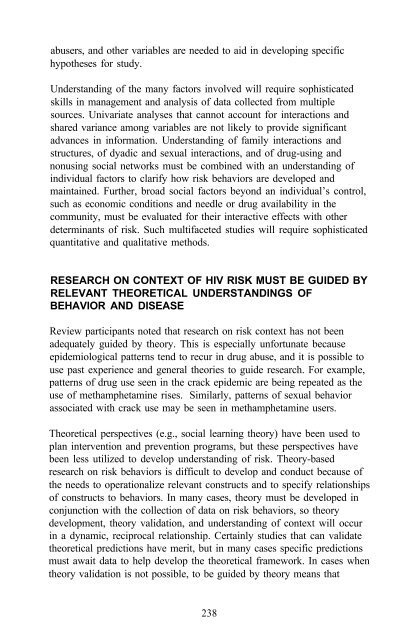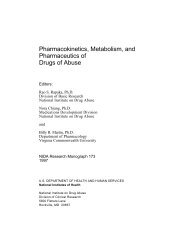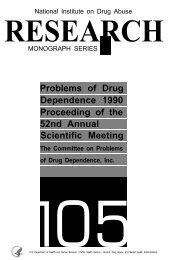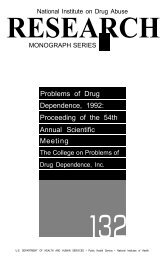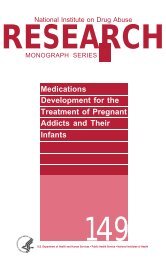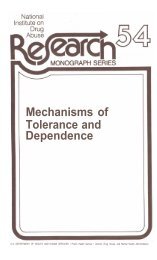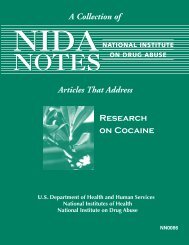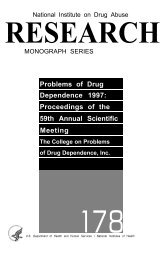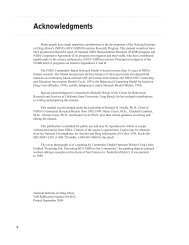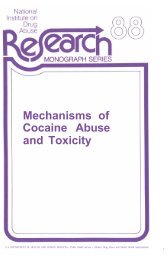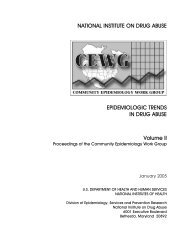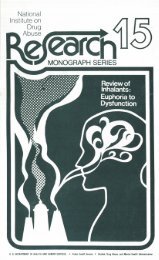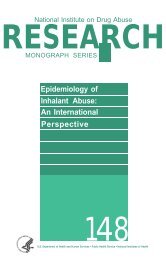The Context of HIV Risk Among Drug Users and Their Sexual Partners
The Context of HIV Risk Among Drug Users and Their Sexual Partners
The Context of HIV Risk Among Drug Users and Their Sexual Partners
You also want an ePaper? Increase the reach of your titles
YUMPU automatically turns print PDFs into web optimized ePapers that Google loves.
abusers, <strong>and</strong> other variables are needed to aid in developing specific<br />
hypotheses for study.<br />
Underst<strong>and</strong>ing <strong>of</strong> the many factors involved will require sophisticated<br />
skills in management <strong>and</strong> analysis <strong>of</strong> data collected from multiple<br />
sources. Univariate analyses that cannot account for interactions <strong>and</strong><br />
shared variance among variables are not likely to provide significant<br />
advances in information. Underst<strong>and</strong>ing <strong>of</strong> family interactions <strong>and</strong><br />
structures, <strong>of</strong> dyadic <strong>and</strong> sexual interactions, <strong>and</strong> <strong>of</strong> drug-using <strong>and</strong><br />
nonusing social networks must be combined with an underst<strong>and</strong>ing <strong>of</strong><br />
individual factors to clarify how risk behaviors are developed <strong>and</strong><br />
maintained. Further, broad social factors beyond an individual’s control,<br />
such as economic conditions <strong>and</strong> needle or drug availability in the<br />
community, must be evaluated for their interactive effects with other<br />
determinants <strong>of</strong> risk. Such multifaceted studies will require sophisticated<br />
quantitative <strong>and</strong> qualitative methods.<br />
RESEARCH ON CONTEXT OF <strong>HIV</strong> RISK MUST BE GUIDED BY<br />
RELEVANT THEORETICAL UNDERSTANDINGS OF<br />
BEHAVIOR AND DISEASE<br />
Review participants noted that research on risk context has not been<br />
adequately guided by theory. This is especially unfortunate because<br />
epidemiological patterns tend to recur in drug abuse, <strong>and</strong> it is possible to<br />
use past experience <strong>and</strong> general theories to guide research. For example,<br />
patterns <strong>of</strong> drug use seen in the crack epidemic are being repeated as the<br />
use <strong>of</strong> methamphetamine rises. Similarly, patterns <strong>of</strong> sexual behavior<br />
associated with crack use may be seen in methamphetamine users.<br />
<strong>The</strong>oretical perspectives (e.g., social learning theory) have been used to<br />
plan intervention <strong>and</strong> prevention programs, but these perspectives have<br />
been less utilized to develop underst<strong>and</strong>ing <strong>of</strong> risk. <strong>The</strong>ory-based<br />
research on risk behaviors is difficult to develop <strong>and</strong> conduct because <strong>of</strong><br />
the needs to operationalize relevant constructs <strong>and</strong> to specify relationships<br />
<strong>of</strong> constructs to behaviors. In many cases, theory must be developed in<br />
conjunction with the collection <strong>of</strong> data on risk behaviors, so theory<br />
development, theory validation, <strong>and</strong> underst<strong>and</strong>ing <strong>of</strong> context will occur<br />
in a dynamic, reciprocal relationship. Certainly studies that can validate<br />
theoretical predictions have merit, but in many cases specific predictions<br />
must await data to help develop the theoretical framework. In cases when<br />
theory validation is not possible, to be guided by theory means that<br />
238


